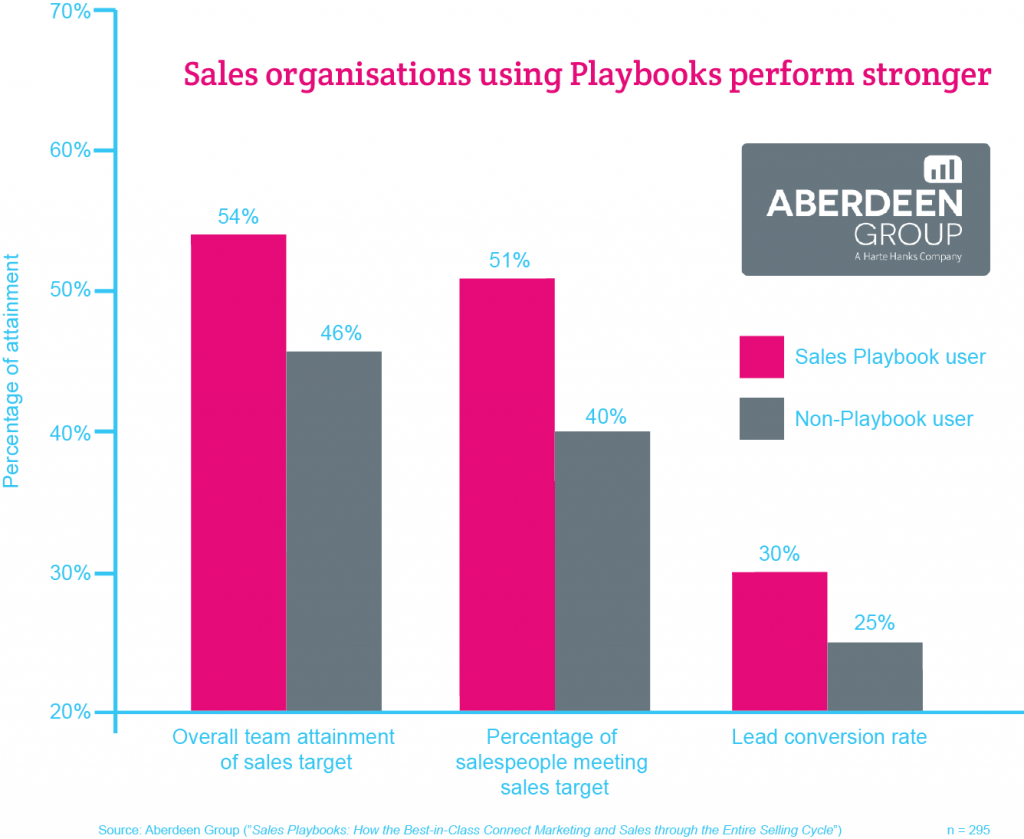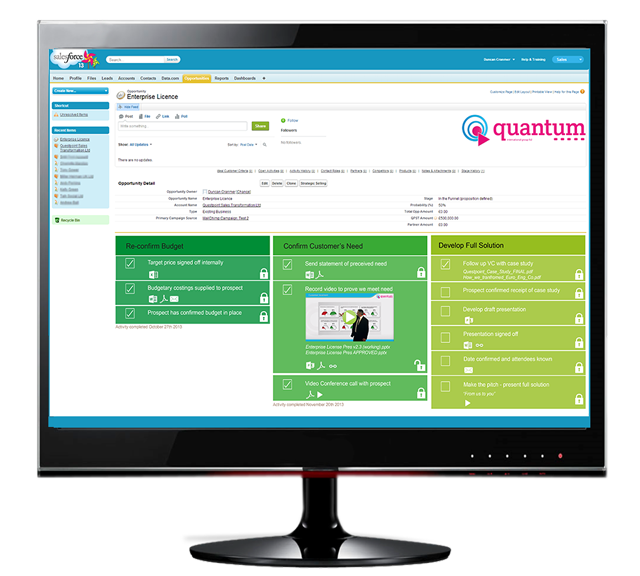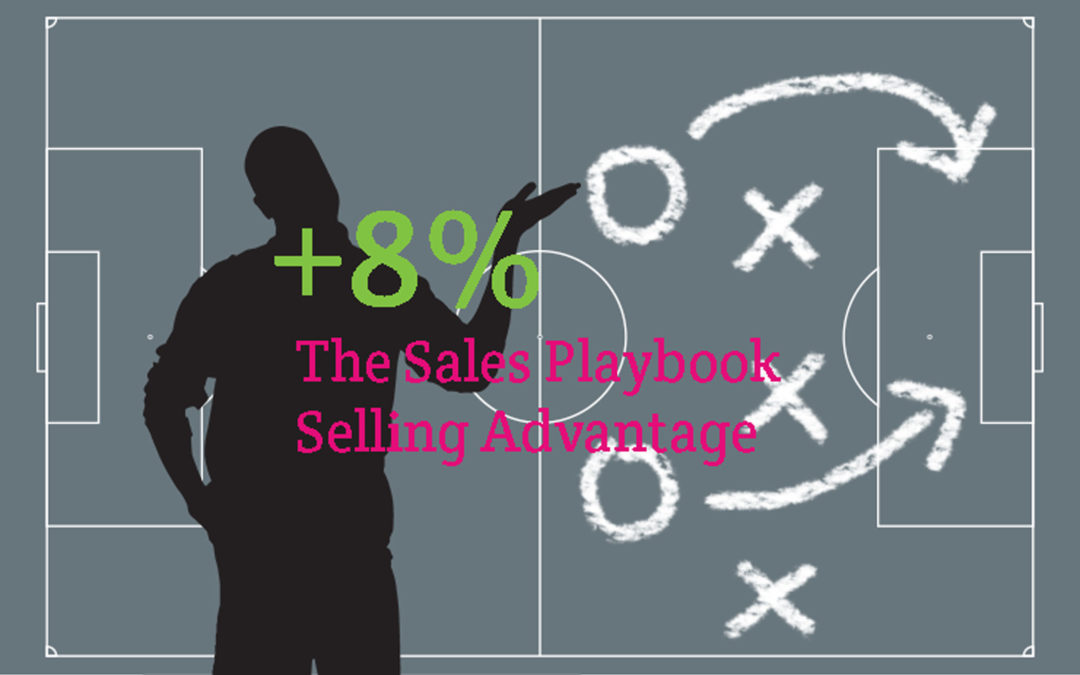Marginal Gains
There’s been a great deal of discussion in sales – as well as in professional sport – over recent years of so-called “marginal gains”.
The idea is that a relatively small change in behaviour could improve performance by quarter or half a percentage point, relatively small gains, but gains that can be the difference between second or third place and winning. And by making a series of incremental changes together your chances of winning are greatly improved.
We are all in favour of margins gains being applied to Sales. But what if there was a single change that could give you an advantage of approaching 10% – such an advantage could blow your competition away …?
The Eight Percent Selling Advantage
 Research by the Aberdeen Group reveals that 54% of salespeople using Sales Playbooks are likely to meet their sales target versus just 46% when no Playbook is available to the sales team.
Research by the Aberdeen Group reveals that 54% of salespeople using Sales Playbooks are likely to meet their sales target versus just 46% when no Playbook is available to the sales team.
Sales Playbooks build upon established sales process to embed the very best practices into every-day selling, thus increasing the success of your salespeople.
The data from the Aberdeen Group highlights an 8% difference in target attainment between Playbook users and non-Playbook users.
If your company’s sales target is $100m having a Playbook could equate to a superior performance of $8m.
Would you like to increase sales by 8%?
Stupid question – of course you would. But, first things first, what is a Sales Playbook?
What is a Sales Playbook?
The term “Playbook” originates from professional sport and athletics where competition is fierce and where the smallest differences in performance can dictate whether you win or lose.
The greatest sports managers and coaches seek to impart their wisdom and knowledge to their teams and top athletes in the form of game-specific and game-changing guidance.
The most successful sports leaders work to understand what their team must do to win by understanding (against a broad strategic background) what precise tactics will lead to success for a particular match or game.
This is the advantage of having a Sales Playbook – sales teams become increasingly empowered to win; and to win more often and to win bigger.
A Sales Playbook is a sales tool which takes existing best practice in Sales and turns it into a step-by-step guide for each deal for everyone in your team. Everyone of your sales people has the benefit of access to the tool; and a well-designed Playbook will be referenced and used every day by all or at least the vast majority of your sales professionals.
An Example of Playbook Usage
 Consider, for example, a relatively new salesperson in your organisation who has been working towards closing a deal with a prospect who is also considering two of your well-established competitors.
Consider, for example, a relatively new salesperson in your organisation who has been working towards closing a deal with a prospect who is also considering two of your well-established competitors.
Suddenly your salesperson is informed that the prospect is seriously considering a third, new competitor – a competitor that she has never heard of.
Imagine how helpful it would be for the new salesperson to automatically be guided to a fact sheet detailing the pros and cons of the unknown competitor previously developed by your company … a fact sheet that would otherwise have been totally unknown by or otherwise invisible to her?
Then, going beyond the highlighting of the (previously unknown) fact sheet a Playbook might additionally:
- Suggest two or three really searching questions that highlight your solution’s strengths whilst discretely, implicitly, hinting at your competitor’s weaknesses
- Identify an existing case study showing how your solution brought great benefits to a client very similar to the prospect who moved away from the new competitor’s solution
Your best and most seasoned sales professionals may already be taking these steps, but chances are that not everyone on your team is operating in quite this way, meaning your team is likely to be under-performing as a whole.
The Playbook approach is essentially one of guiding the salesperson throughout the sales process, providing valuable real-time support and assistance throughout the sales cycle for all sorts of salespeople (telesales, senior field sales, partner managers etc.).
Playbooks help gives sales people real clarity on what must come next to ensure a successful sales cycle outcome …
… The essential next steps are put into sharp relief for your sales people.
What does a Playbook Look Like?
Every Playbook is different, so every Playbook looks different. There are two essential classifications. Playbooks can be “manual” (this is, static) or “dynamic”. “Dynamic Playbooks” are application based, integrated into existing sales system infrastructure, such as the corporate CRM system. The great advantage of a dynamic Playbook is that the guidance automatically adjusts itself to cater for the twists and turns of a real-life sales opportunity. (This level of sophistication requires IT – such flexibility is simply outside of the scope of static Playbooks).
The example here shows a sample Playbook integrated into a CRM application, in this case the popular Salesforce.com CRM application.At each step of the sales journey the sales person is prompted with advice, guidance and resources relevant to the prospect’s needs and the stage of the sales cycle that we are at.
Resources may include coaching videos, fact sheets, competitor analysis and sample templates to use in correspondence with the prospect.
What is driving the need for Playbooks?
 More and more companies are adopting Sales Playbooks, with others giving serious consideration to them. Why?We – and our buyers – are living in an era of information overload.
More and more companies are adopting Sales Playbooks, with others giving serious consideration to them. Why?We – and our buyers – are living in an era of information overload.
The Playbook helps us, as salespeople, speedily cut to the chase and focus on what is truly important, cutting out the “noise”.
However, we do need to be careful here. Salespeople tend to reject what is or can be perceived as heavy-handed management control.
But, conversely, they embrace and warmly welcome timely sales guidance – Sales Playbooks provide such guidance.
Playbooks align sales activities more closely with optimised sales process without laborious and invasive management, freeing up your management time for where it is really needed.
They help salespeople deal more ably with buyers who are savvier than ever before; so, salespeople can be more agile in an increasingly complex marketplace.
 The “lone wolf” sales model is defunct – effective sales organisations are more collaborative and team-oriented than at any previous time.
The “lone wolf” sales model is defunct – effective sales organisations are more collaborative and team-oriented than at any previous time.But let’s get under the hood. How is the 8% gain delivered?
Benefits of a Sales Playbook
Playbook adopters close more deals by arming their sales team with the right information, at the right time in a context appropriate to their unique selling situation. How?
- Superior guidance and coaching for salespeople
- That guidance is specific to the individual sales situation – i.e. totally relevant to that deal – rather than generic
- Right information is delivered up to the salesperson at the right time
- Meets the need for improved speed and efficiency in Sales
- Drives improved consistency within the team, holding excellence as a realistic target for every sale
- Harnesses the value of team working
- Reinforces your preferred sales methodology
- Provides the capability to better-manage bigger, more complex deals
- Faster on boarding – turn new salespeople into winners faster
- Sales leaders spend less time intervening in and helping with low-level matters, freeing management to be able to spend more time making a real difference to prioritised sales
- Improved sales forecasting accuracy
Types of Playbook – which is best for me?
Irrespective of whether you elect to adopt a dynamic or static Playbook there are four types of Playbook overall.
Working out which of these four types is going to work best for you depends on the nature of the sales challenges you are looking to solve. Perhaps, because of a recent acquisition, a large element of your recently enlarged sales team is new and largely unfamiliar with the established sales process? Or perhaps your sales process needs to be updated, formalised and then really used? Maybe you are about to launch a new product or service, the success of which is truly mission critical and you need to increase your chances of success with the new offer?
The four types of Playbook – which cater for these types of scenario – are:
- The Sales Process Playbook
- The Playbook to support the rollout and sale of a brand-new solution in the marketplace
- A Playbook that helps new salespeople get up to speed with the basics of their job as quickly as possible
- The Sales Manager’s Playbook assists your senior sales leaders to become most effective in their management roles; such a Playbook is invariably the companion to one of the other types, making sure that sales executives’ and managers’ efforts are combined for optimal effect
Decide which type – or types – is going to give you the best commercial return.
How Easy is it to Implement a Sales Playbook?
 This is the “how long is a piece of string question”! Many issues must be taken into account here including:
This is the “how long is a piece of string question”! Many issues must be taken into account here including:
- The length of your average sales cycle
- The complexity and size of your solution / product set
- The capabilities of your people
- Existing business priorities and commitments
- Cultural readiness for change
- Your geographical focus and capability
- The right sort of Playbook for you
- Whether you wish to go down the “manual” or “dynamic” Playbook route
- How IT savvy is your organisation and your sales people
Since there is quite a lot to consider here (and this is a simplified list) we have put together a Sales Playbook Executive Briefing Paper for sales leaders entitled “Why and how to develop a Playbook”.
The Executive Briefing Paper gets much deeper into the potential benefits of Sales Playbooks for sales organisations such as yours and provides a roadmap for implementation together with tips for a successful Playbook rollout.
To request your copy click here.
And take a big step towards a really compelling competitive advantage for your sales organisation.


